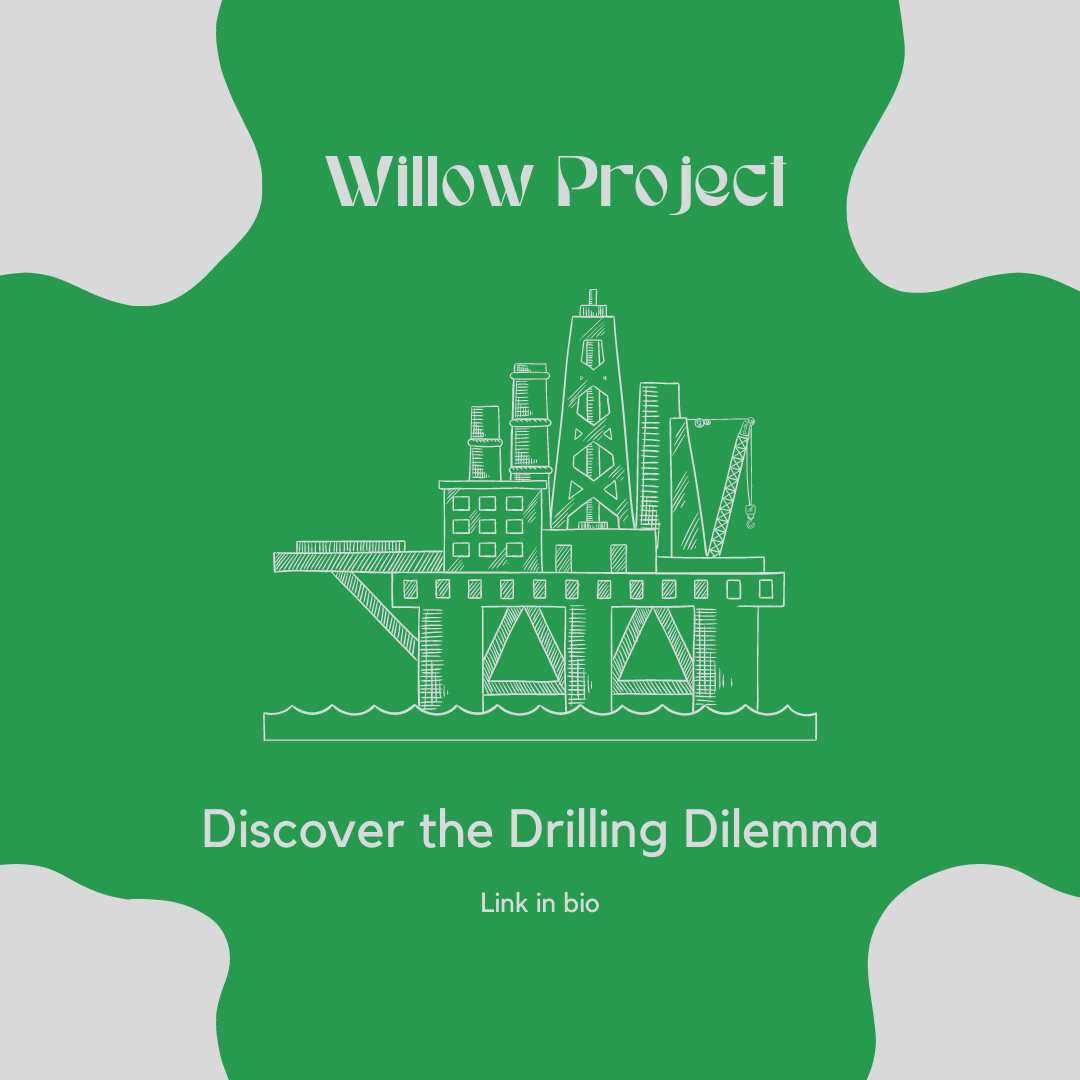Just in November of this year, the Alaskan federal court ruled that the oil drilling project – Willow project – can proceed. When lawsuits were filed by climate activists in March, environmental groups challenged the Willow Project on behalf of several Alaskan environmental laws. The extraction of oil in Alaska would lead to extreme damage of indigenous ecosystems and negatively impact the arctic circle. As such, the federal judge’s approval of the project gives rise to an urgent environmental alarm. However, the Willow Project is not a new idea, in fact since the beginning of Trump’s presidency, this drilling project has caused an uproar of concern among environmental groups.

What is the Willow Project?
Oil drilling has been a common practice in today’s modern industrial world. It is a rich and constantly growing industry due to the largest amounts of the natural resources extracted for electricity and vehicles. However, it is not a sustainable practice as it is highly polluting and is a finite and scarce natural resource. Governments worldwide are constantly looking for new extraction sites as the most predominant ones in the Middle East will eventually run out.
The Willow Project was originally proposed by ConocoPhillips and approved by president Donald Trump in 2020. ConocoPhillips is the sole driller of oil in Alaska, regardless of being a Houston based electricity company. Under Trump’s approval, ConocoPhillips was set to construct five drilling pads, however under Biden’s presidency this number was reduced to three. The start of the construction of the $8 billion project has not yet been determined, but once construction starts, it is set to change the global dynamics of oil supply.
It is estimated that the project would produce 576 million barrels of oil over the course of 30 years. In addition, it is set to cover an area of 499 acres (roughly the size of Indiana!) full of roads, pipelines, airstrips, and gravel mines. The US’ largest oil drilling plan in history aims to produce 180,000 barrels of oil a day on top of the 489,000 barrels that currently pass through the trans-Alaska pipeline today.
Because environmental groups had hoped that under Biden’s administration there would be fewer investment in unsustainable projects such as these, there has been a rise in concern about the project’s effects. Of course, since it will only increase the supply and therefore use of oil, this project will not go through without having serious implications on the environment and progress towards a carbon-neutral future.

Implications for the environment and the future
Several exponents of environmental associations expressed their concern about Biden administration’s choice to approve the project. Hallie Templeton, Legal Director at Friends of the Earth stated: “We are extremely disappointed in today’s decision, which will have tragic consequences for Arctic communities, wildlife, and our planet as a whole.”
“The science is crystal clear: we cannot afford any new oil and gas projects, much less a monster project like Willow, if we want to avoid the worst impacts of global warming,” said Tim Donaghy, research manager at Greenpeace USA.
Indeed, the use of fossil fuels results in significant negative externalities for the climate, the environment and our health. When fossil fuels are burned, they emit greenhouse gasses like carbon dioxide that, trapped in the atmosphere, contribute to climate change. This leads to ocean acidification, as at least a quarter of the carbon dioxide from fossil fuels is absorbed by the oceans, and to extreme weather that results in natural disasters. Another climate consequence is the sea level rise: global warming is melting glaciers and land-based ice sheets, resulting in global sea level rise.
Moreover, oil combustion has many negative environmental consequences: water and air pollution, oil spills and plastic pollution. The process of extraction, transportation and transformation often lead to oil spills that destroy habitats and kill birds and marine life. In addition to this, over 99% of plastics are made from fossil fuels, 14 tons of which end up in the ocean killing wildlife and polluting the food chain.
Finally, the combustion of fossil fuels influences our everyday life as air pollution can cause multiple health issues. Air pollution from fossil fuels is known as the “invisible killer.” It can lead to respiratory and cardiovascular diseases and is responsible for more than 13% of deaths in people aged 14 and older in the United States. Fossil fuel development can also leak toxic substances into the soil and drinking water sources, causing cancer, birth defects and liver damage.
For these reasons, the Willow project shouldn’t be allowed as it represents a huge risk for people and the environment.
In addition to this, the approval of the project would also be a huge setback from the commitment shown from President Biden in the fight to climate change when in January 2020, on his first day in office, he signed the instrument to bring the United States back into the Paris Agreement. Using Willow’s oil would put into the atmosphere an estimated 239 million metric tons of carbon dioxide during 30 years, the equivalent of driving 1.7 million gasoline-powered cars every year until 2053. Allowing these kinds of emissions would be a real threat to decarbonisation and the elimination of fossil fuels, key steps to meet Paris agreement’s goals of limiting the rise of temperatures to 1.5° and to reach net-zero emissions in the second half of the century.
The huge investment in the Willow project, together with Biden’s absence from the COP28, place the United States in a new worrying position regarding the environmental issue.

By Elena Molinari and Anna Sofia Silvani
https://edition.cnn.com/2023/03/14/politics/willow-project-oil-alaska-explained-climate/index.html
https://www.wilderness.org/articles/blog/7-ways-oil-and-gas-drilling-bad-environment
https://www.theguardian.com/environment/2021/feb/09/fossil-fuels-pollution-deaths-research
https://www.wired.it/article/cop28-dubai-onu-clima-emissioni-zero/#uno




